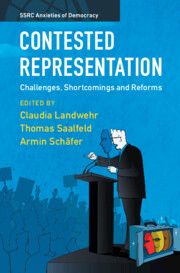Book contents
- Contested Representation
- SSRC Anxieties of Democracy
- Sponsored by the Social Science Research Council
- Contested Representation
- Copyright page
- Contents
- Figures
- Tables
- Contributors
- Acknowledgments
- 1 Introduction
- Part I The Contested Idea of Political Representation
- 2 Contested Representation
- 3 Deliberative Minipublics and the Populist Conception of Representation As Embodiment
- 4 An Evolved Representative Democracy in a Brave New World of Ideological Protest
- 5 Rising to the Challenge?
- 6 Progress and Failure in Achieving Equal Representation
- Part II Representation and Responsiveness in Unequal Societies
- Part III Polarization, New Cleavages, and Shifts in Democratic Government
- Part IV Constitutional Crisis and Institutional Reform
- Bibliography
- Index
3 - Deliberative Minipublics and the Populist Conception of Representation As Embodiment
from Part I - The Contested Idea of Political Representation
Published online by Cambridge University Press: 03 November 2022
- Contested Representation
- SSRC Anxieties of Democracy
- Sponsored by the Social Science Research Council
- Contested Representation
- Copyright page
- Contents
- Figures
- Tables
- Contributors
- Acknowledgments
- 1 Introduction
- Part I The Contested Idea of Political Representation
- 2 Contested Representation
- 3 Deliberative Minipublics and the Populist Conception of Representation As Embodiment
- 4 An Evolved Representative Democracy in a Brave New World of Ideological Protest
- 5 Rising to the Challenge?
- 6 Progress and Failure in Achieving Equal Representation
- Part II Representation and Responsiveness in Unequal Societies
- Part III Polarization, New Cleavages, and Shifts in Democratic Government
- Part IV Constitutional Crisis and Institutional Reform
- Bibliography
- Index
Summary
Amidst increased dissatisfaction with representative democracies new forms of direct political participation by ordinary citizens are becoming increasingly popular. There has been a proliferation of proposals for inserting deliberative minipublics such as citizens’ assemblies, citizens juries or deliberative polls in the political process. Indeed, many democratic theorists see these mechanisms as the best hope for overcoming the many representational “gaps” that afflict traditional party systems – gaps that have produced alarming levels of citizens’ apathy and disenchantment with democracy.1 However, despite the interest that these new forms of citizen involvement have garnered there has been little analysis of the specific nature of political representation that they involve.2 In which sense are citizens who participate in minipublics supposed to be representatives of the rest of the citizenry? Can they act both as citizens in their own right and as representatives of non-participants at the same time?
- Type
- Chapter
- Information
- Contested RepresentationChallenges, Shortcomings and Reforms, pp. 32 - 45Publisher: Cambridge University PressPrint publication year: 2022



